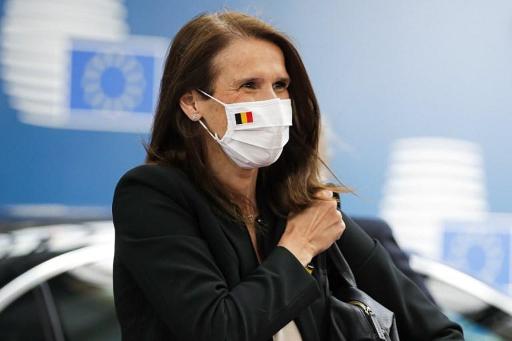In the early hours of Tuesday morning, Belgium's Prime Minister Sophie Wilmès welcomed several positive points for Belgium in the agreement reached between the 27 Heads of State and Government in Brussels on the EU's multiannual financial framework 2021-2027 and the €750 billion recovery instrument based on it.
"The length of this summit is as exceptional as the agreement that has just been reached," said Wilmès, after a marathon summit that lasted from Friday morning until early Tuesday morning.
A number of points made by Belgium were heard, which the Prime Minister was delighted to hear. The final package thus maintains the €5 billion 'Brexit' adjustment fund, which was included for the first time by European Council President Charles Michel, in his pre-summit proposal.
Another of Belgium's battle-horses has undergone a surprise reversal: while there was talk of reducing the share that countries can retain of customs duties in the form of collection costs, this share is finally increased (to 25%) in the final agreement.
This has important financial consequences for Belgium, a country that imports via its ports. The measure had to be included to appease the Netherlands, the leader of the "frugal" countries that are reluctant to untie the purse strings for stimulus grants to the countries of the South.
Related News
- Frugal Five delay agreement on EU recovery plan
- EU more prepared for future outbreaks but coordination still key
- Dutch PM: Italy, Spain and Portugal will only get Covid-19 relief funds after reforms
It will also help to reduce somewhat the additional financial effort required of Belgium, as well as all other capitals, following the departure of the United Kingdom, which was a large net contributor to the European budget.
According to the Wilmès cabinet, the "overall additional budgetary impact" of the next multi-annual budget for the Belgium "is estimated at €1.16 billion per year, with a GNI contribution that will increase by €1 billion. The first figures that had circulated were around €1.7 billion. On the other hand, returns are estimated for the main programmes at €18.3 billion."
Overall, "the discussion was tough" during the summit, the Prime Minister acknowledged. But the agreement reached, with the maintenance of the overall amounts provided for by Charles Michel, is "probably equal to the challenges we will still have to face" at EU level, she believes.
EU greenlights massive recovery plan
The European Union heads of state and government gave their agreement on Tuesday in Brussels to a massive recovery fund (€750 billion) to help the European countries most affected by the coronavirus crisis, on the morning of the fifth day of a marathon summit.
"Deal!" tweeted Council President Charles Michel, at around 5:30 AM in the morning.
The EU-27 agreed on the use of a joint loan to be taken out by the European Commission on the financial markets on a scale never seen before in the EU's history, to redistribute the money in the form of grants and loans to the countries and sectors most affected by the crisis.
The fund is backed by the EU's multi-annual budget (2021-2027) set at €1,074 billion, as originally proposed by Michel.
The EU-27 had to take into account the strong reticence of a group of five states described as "frugal" (the Netherlands, Austria, Sweden and Denmark, joined by Finland), but also that of Poland and Hungary regarding the link between the payment of EU funds and respect for the rule of law.
The whole package will still have to be negotiated with the European Parliament before entering into force.
"We have an agreement. And a good one! With a 2021-2027 budget of €1.074 billion and a €750 billion recovery plan, never before has the European Union decided to invest so ambitiously in the future," commented Belgian Prime Minister Sophie Wilmès on Twitter.
The Brussels Times

